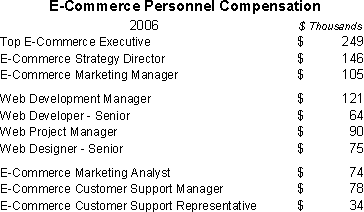IDEX Online Research: Complex Skill Set Required for Online Marketing Executives
November 26, 06
Back in the early days of online retailing, merchants seeking web-savvy employees hired techies – some called them computer geeks – to run their internet sales operations. Today, that employee isn’t the right person for online retailers.
Today’s ideal chief of online retailing is probably a marketing person first, and a techie second. Technology is no longer the driver of online sales; marketing drives sales. Every website with tenure utilizes the latest technology; shoppers have come to expect one-click purchasing capability.
The problem facing retailers, especially bricks-and-mortar retailers who have made significant strides into online retailing, is that the true online merchant – director of online sales – can be difficult to find. The combination of a marketing-and-tech savvy person represents a set of experiences not found in any traditional corporate career track. Further, few business schools have developed a curriculum to turn out these people.
For example, the head of online retailing should be able to understand the concept of “haptics” – how to compensate for the impossibility of actually touching a physical product when shopping online. Many shoppers need to be able to touch the product – a tactile process – before they are willing to buy. Online marketers must be part psychologist to understand how to overcome the tactile factor in the shopping process.
Jewelers: Late to the Party
The problem is more complex for jewelers. Not only have they been slow to embrace online retailing, but they tend to be a group of do-it-yourselfers. As a result, many of their websites are amateurish and not fully functional.
Further, today’s jewelers operate on razor thin margins, and they don’t have an adequate budget to create a successful online retailing effort.
Among the major chain jewelers, Zale has been selling online for several years, but with minimal success. Last year, we believe that Zale’s online revenues were in the range of $30 million, or about 1 percent of total corporate revenues. That’s an insignificant level, especially for a major retailer. Kay has just launched e-commerce, and no data is available. Overall, total online retail sales in the U.S. for all retail categories represents about just over 2 percent of total retail sales; in the jewelry category, online jewelry sales represent over 3 percent of total industry sales. Most of the online market share has been captured by dedicated online merchants such as Blue Nile and others.
Recruiters Can Help, But With A Caveat
How can a retailer hire the right person for the online marketing job? Many retailers turn to outside recruiters. However, recruiters say that their job is made difficult by merchants who really don’t know what they want. Online marketing positions do not have set job descriptions.
There are some things a retailer can use as benchmarks for potential hirees, according to an article in Internet Retailer (November 2006).
- While online marketing is a new industry, it now has enough history that a potential candidate for a job should have a demonstrated track record of success. “These positions are no longer about technical prowess, but about performance prowess,” says Internet Retailer.
- Deep-pocket upfront signing bonuses have given way to compensation packages that are tied to performance. If an online marketing manager can move the needle from A to B, they are paid an incentive.
- When searching the background of potential online marketers, an analytical bias may be a better indicator of success than specific information technology skills. Some companies hire English majors who can write creatively, because too many techies are accustomed to ignoring grammar when online.
- Once a retailer is up and running – likely with an off-the-shelf internet commerce package – less attention should be paid to technical issues and more attention focused to experiential and marketing issues.
Good News: Salaries Generally Down for Online Marketers
In the early days of online retailing, the online marketer’s job was a mystery. Employers didn’t know what he or she did – voodoo, maybe, to create sales – and there were no salary benchmarks.
However, salaries for top executive online marketing executives have come down significantly since Mercer Human Resource Consulting began tracking online marketers’ compensation packages in 2002. For example, the top corporate e-commerce executive for retailers (any size company) earned about $250,000 in 2006, roughly 30 percent less than the $375,000 for the same job in 2002. At the bottom of the food chain, however, salaries have risen. For example, e-commerce customer support reps for retailers earn about $34,000 today versus about $22,000 in 2002.
The following table summarizes the salary scale that retailers can expect to pay for various members of their e-commerce team.
 Source: Mercer Human Resource Consulting |